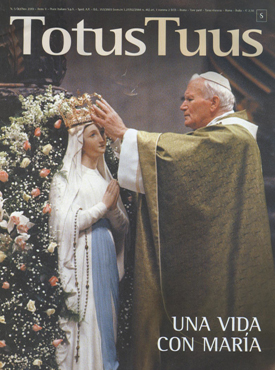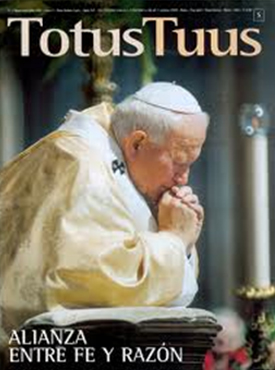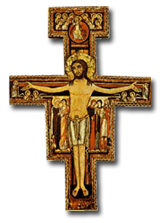The City of God



Building a civilization of love
by Monsignor Jean Laffitte, vice president of the Pontifical Academy for Life.
Whenever a human being bases his actions upon the love of Jesus Christ, he contributes to the building up of a society of love that flourishes a culture of life. Such love, centered in an encounter and relationship with the living Lord that is most personal, serves as the basis of natural law, such that when a person carries out any self-giving act, his true nature as a human being is more fully revealed. John Paul II emphasized that “making a sincere self-gift ... is the most important dimension of the civilization of love” (Letter to Families, 14).
However, wherever man refuses to offer himself as self-gift to God and others, and fails to respect the dignity inherent in human beings who have been formed in the image and likeness of the Creator, he foments a culture of death that leads to the breakdown of relationships and society, ultimately reducing the human being in a utilitarian manner to serving merely as an instrument for personal gain or pleasure. In such a culture of death, the human being is not valued for his intrinsic personal value and consequently is all too frequently considered disposable once the person has served his perceived purpose.
Pope Benedict XVI’s call (2007 Message for World Youth Day) to build a “civilization of love,” providing a tool geared especially toward young adults to help them seriously ponder their vital personal role in transforming the world, through the active witness of Jesus Christ’s sacrificial love in their lives. In this work, it is addresses two poignant questions concerning our fundamental approach to culture: “What kind of a people do we think we are? And what kind of a people are we becoming?” The answers to such questions may lead all people to reflect seriously upon whether they truly are contributing to the establishment of a civilization of love, which according to John Paul II passes primarily through the family, or rather to an ever-burgeoning culture of death that seeks to destroy the integrity of marriage and family, fundamental building blocks of a civilization of love. Reflecting further the thought of John Paul II, we can emphasizes that no culture can remain static, and no person within that culture may remain static either. Each culture, and each person within it, moves between the polarities of a culture of life that sees human beings for their intrinsic, God-given value, and a culture of death that holds human beings to be mere “products of blind, mechanical, and amoral forces, one in which human life has only a kind of quantitative, economic value ... as units of production (or consumption).” Individuals who cannot prove their value in such terms of production -- such as “the unborn, the elderly, and the disabled -- are increasingly subject to removal by procedures such as abortion and euthanasia,” which often are falsely masked by a humanitarian facade rooted in a “belief in progress.” Views of progress that have become distorted by concentrating on merely materialistic aspects of life will tend toward neglecting the inherent dignity of the human person, consequently generating increasing threats to the world and humanity by encouraging a mentality of slavery, an approach that regards other human beings as mere objects to be used.
John Paul II asserts that Christians have the responsibility to transform culture radically, to carry the example of St. Paul’s preaching on the Areopagus into our present age “not by imposing values from above, but through a subtler yet more powerful process -- living a vocation of love in the day-to-day reality of our lives,” a love whose actions are grounded in the sacrificial love of Jesus Christ. This vocation of love is written upon the heart of each person and makes each person human, and living out this calling leads to a culture that values human beings not because they are useful or productive, but rather because they are loved by the Creator and thus have inherent worth. By holding firm to the truth that the structure of human existence is love, such that “I have first been loved, therefore I am,” we may transform an ever-present “culture of suspicion” into one that embraces responsibility for every human being, respecting the freedom and dignity of each individual in an authentic culture of life.
Building up a civilization of love involves a personal willingness to see Christ in the suffering of all human beings around us, such that our only response to them is one of responsibility for them in love. As Pope Benedict reminds us in "Deus Caritas Est" (34), “My deep personal sharing in the needs and sufferings of others becomes a sharing of my very self with them,” with such a disposition serving as an essential aspect of the Christian work of charity. Anderson challenges his readers to confront difficult questions at both a personal and cultural level concerning attitudes toward the poor, handicapped, sick, and vulnerable (both born and unborn) -- Do I look at them as means rather than as ends? Do I see some persons as having no value apart from their real or imagined use to society? Do I affirm the equal dignity of every human being not only in law, but in practice?
In building a culture of life that flourishes within a civilization of love, marriage and family serve as true “living stones” of its foundation. Any attempt to attack the humanity of the unborn child, the non-rehabilitable sick, or other vulnerable person must be rebuffed even at the risk of that life defender’s personal reputation or welfare. Individualism and freedom can never be idolized; rather, they must be preserved from perversion so that a distorted perception of freedom does not become the vehicle through which to assault human dignity and life. Such tenets serve no purpose in building a civilization of love and its culture of life if not witnessed through personal example and testimony, an integrated Christian witness that demonstrates a right ordering between faith and reason in daily living.
John Paul II’s reminder for us all to be a “people of life and a people for life” (EV, 6) rings prophetically true in our postmodern age. It is only by recognizing the incomparable value and dignity of every human being regardless of age, condition, or race; by acknowledging that it always violates human dignity to use another human being as a mere instrument or means to an end; and by admitting that the intentional killing of an innocent human being can never be morally justified, that a culture of life may flourish into fuller being and a culture of death cease to exist. A culture of life ultimately may thrive when the citizens of this world honor “Christ as above culture -- as one who is always present to transform culture”, Who changes one heart at a time in His love, building a true civilization of love through each one of us, whom He calls to regard each other human being in “fraternal charity with a pure love” (Benedict XVI, Christianity and the Crisis of Cultures).
Whenever a human being bases his actions upon the love of Jesus Christ, he contributes to the building up of a society of love that flourishes a culture of life. Such love, centered in an encounter and relationship with the living Lord that is most personal, serves as the basis of natural law, such that when a person carries out any self-giving act, his true nature as a human being is more fully revealed. John Paul II emphasized that “making a sincere self-gift ... is the most important dimension of the civilization of love” (Letter to Families, 14).
However, wherever man refuses to offer himself as self-gift to God and others, and fails to respect the dignity inherent in human beings who have been formed in the image and likeness of the Creator, he foments a culture of death that leads to the breakdown of relationships and society, ultimately reducing the human being in a utilitarian manner to serving merely as an instrument for personal gain or pleasure. In such a culture of death, the human being is not valued for his intrinsic personal value and consequently is all too frequently considered disposable once the person has served his perceived purpose.
Pope Benedict XVI’s call (2007 Message for World Youth Day) to build a “civilization of love,” providing a tool geared especially toward young adults to help them seriously ponder their vital personal role in transforming the world, through the active witness of Jesus Christ’s sacrificial love in their lives. In this work, it is addresses two poignant questions concerning our fundamental approach to culture: “What kind of a people do we think we are? And what kind of a people are we becoming?” The answers to such questions may lead all people to reflect seriously upon whether they truly are contributing to the establishment of a civilization of love, which according to John Paul II passes primarily through the family, or rather to an ever-burgeoning culture of death that seeks to destroy the integrity of marriage and family, fundamental building blocks of a civilization of love. Reflecting further the thought of John Paul II, we can emphasizes that no culture can remain static, and no person within that culture may remain static either. Each culture, and each person within it, moves between the polarities of a culture of life that sees human beings for their intrinsic, God-given value, and a culture of death that holds human beings to be mere “products of blind, mechanical, and amoral forces, one in which human life has only a kind of quantitative, economic value ... as units of production (or consumption).” Individuals who cannot prove their value in such terms of production -- such as “the unborn, the elderly, and the disabled -- are increasingly subject to removal by procedures such as abortion and euthanasia,” which often are falsely masked by a humanitarian facade rooted in a “belief in progress.” Views of progress that have become distorted by concentrating on merely materialistic aspects of life will tend toward neglecting the inherent dignity of the human person, consequently generating increasing threats to the world and humanity by encouraging a mentality of slavery, an approach that regards other human beings as mere objects to be used.
John Paul II asserts that Christians have the responsibility to transform culture radically, to carry the example of St. Paul’s preaching on the Areopagus into our present age “not by imposing values from above, but through a subtler yet more powerful process -- living a vocation of love in the day-to-day reality of our lives,” a love whose actions are grounded in the sacrificial love of Jesus Christ. This vocation of love is written upon the heart of each person and makes each person human, and living out this calling leads to a culture that values human beings not because they are useful or productive, but rather because they are loved by the Creator and thus have inherent worth. By holding firm to the truth that the structure of human existence is love, such that “I have first been loved, therefore I am,” we may transform an ever-present “culture of suspicion” into one that embraces responsibility for every human being, respecting the freedom and dignity of each individual in an authentic culture of life.
Building up a civilization of love involves a personal willingness to see Christ in the suffering of all human beings around us, such that our only response to them is one of responsibility for them in love. As Pope Benedict reminds us in "Deus Caritas Est" (34), “My deep personal sharing in the needs and sufferings of others becomes a sharing of my very self with them,” with such a disposition serving as an essential aspect of the Christian work of charity. Anderson challenges his readers to confront difficult questions at both a personal and cultural level concerning attitudes toward the poor, handicapped, sick, and vulnerable (both born and unborn) -- Do I look at them as means rather than as ends? Do I see some persons as having no value apart from their real or imagined use to society? Do I affirm the equal dignity of every human being not only in law, but in practice?
In building a culture of life that flourishes within a civilization of love, marriage and family serve as true “living stones” of its foundation. Any attempt to attack the humanity of the unborn child, the non-rehabilitable sick, or other vulnerable person must be rebuffed even at the risk of that life defender’s personal reputation or welfare. Individualism and freedom can never be idolized; rather, they must be preserved from perversion so that a distorted perception of freedom does not become the vehicle through which to assault human dignity and life. Such tenets serve no purpose in building a civilization of love and its culture of life if not witnessed through personal example and testimony, an integrated Christian witness that demonstrates a right ordering between faith and reason in daily living.
John Paul II’s reminder for us all to be a “people of life and a people for life” (EV, 6) rings prophetically true in our postmodern age. It is only by recognizing the incomparable value and dignity of every human being regardless of age, condition, or race; by acknowledging that it always violates human dignity to use another human being as a mere instrument or means to an end; and by admitting that the intentional killing of an innocent human being can never be morally justified, that a culture of life may flourish into fuller being and a culture of death cease to exist. A culture of life ultimately may thrive when the citizens of this world honor “Christ as above culture -- as one who is always present to transform culture”, Who changes one heart at a time in His love, building a true civilization of love through each one of us, whom He calls to regard each other human being in “fraternal charity with a pure love” (Benedict XVI, Christianity and the Crisis of Cultures).
The Virtue of Charity
Pope St. Leo the Great
Early Church Father & Doctor of the Church
This excerpt from a sermon by Saint Leo the Great (Sermo 10 in Quadragesima, 3-5: PL 54, 299-301) on the theological virtue of charity or divine love (called “agape” in the New Testament) is used in the Roman Catholic Office of Readings for Tuesday of the 4th week of Lent. The accompanying lenten biblical reading is Leviticus 19: 1-18, 31-37. This sermon, originally given around the year 450 AD, outlines the importance of the corporal works of mercy, especially during the season of Lent. It is, in fact, a clear testimony to the observance of Lent in the early Church (5th century) and how fasting should be tied to almsgiving.
In the gospel of John the Lord says: In this will all men know that you are my disciples, if you have love for each other. In a letter of the same apostle we read: Beloved, let us love one another, for love is from God, and everyone who loves is born of God and knows God; he who does not love does not know God for God is love.
The faithful should therefore enter into themselves and make a true judgment on their attitudes of mind and heart. If they find some store of love’s fruit in their hearts, they must not doubt God’s presence within them. If they would increase their capacity to receive so great a guest, they should practice greater generosity in doing good, with persevering charity.
If God is love, charity should know no limit, for God cannot be confined.
Any time is the right time for works of charity, but these days of Lent provide a special encouragement. Those who want to be present at the Lord’s Passover in holiness of mind and body should seek above all to win this grace, for charity contains all other virtues and covers a multitude of sins.
As we prepare to celebrate that greatest of all mysteries, by which the blood of Jesus Christ did away with our sins, let us first of all make ready the sacrificial offerings of works of mercy. In this way we shall give to those who have sinned against us what God in his goodness has already given to us.
Let us now extend to the poor and those afflicted in different ways a more open-handed generosity, so that God may be thanked through many voices and the relief of the needy supported by our fasting. No act of devotion on the part of the faithful gives God more pleasure than that which is lavished on his poor. Where he finds charity with its loving concern, there he recognizes the reflection of his own fatherly care.
In these acts of giving do not fear a lack of means. A generous spirit is itself great wealth. There can be no shortage of material for generosity where it is Christ who feeds and Christ who is fed. In all this activity there is present the hand of him who multiplies the bread by breaking it, and increases it by giving it away.
The giver of alms should be free from anxiety and full of joy. His gain will be greatest when he keeps back least for himself. The holy apostle Paul tells us: He who provides seed for the sower will also provide bread for eating; he will provide you with more seed, and will increase the harvest of your goodness, in Christ Jesus our Lord, who lives and reigns with the Father and the Holy Spirit for ever and ever. Amen.
Early Church Father & Doctor of the Church
This excerpt from a sermon by Saint Leo the Great (Sermo 10 in Quadragesima, 3-5: PL 54, 299-301) on the theological virtue of charity or divine love (called “agape” in the New Testament) is used in the Roman Catholic Office of Readings for Tuesday of the 4th week of Lent. The accompanying lenten biblical reading is Leviticus 19: 1-18, 31-37. This sermon, originally given around the year 450 AD, outlines the importance of the corporal works of mercy, especially during the season of Lent. It is, in fact, a clear testimony to the observance of Lent in the early Church (5th century) and how fasting should be tied to almsgiving.
In the gospel of John the Lord says: In this will all men know that you are my disciples, if you have love for each other. In a letter of the same apostle we read: Beloved, let us love one another, for love is from God, and everyone who loves is born of God and knows God; he who does not love does not know God for God is love.
The faithful should therefore enter into themselves and make a true judgment on their attitudes of mind and heart. If they find some store of love’s fruit in their hearts, they must not doubt God’s presence within them. If they would increase their capacity to receive so great a guest, they should practice greater generosity in doing good, with persevering charity.
If God is love, charity should know no limit, for God cannot be confined.
Any time is the right time for works of charity, but these days of Lent provide a special encouragement. Those who want to be present at the Lord’s Passover in holiness of mind and body should seek above all to win this grace, for charity contains all other virtues and covers a multitude of sins.
As we prepare to celebrate that greatest of all mysteries, by which the blood of Jesus Christ did away with our sins, let us first of all make ready the sacrificial offerings of works of mercy. In this way we shall give to those who have sinned against us what God in his goodness has already given to us.
Let us now extend to the poor and those afflicted in different ways a more open-handed generosity, so that God may be thanked through many voices and the relief of the needy supported by our fasting. No act of devotion on the part of the faithful gives God more pleasure than that which is lavished on his poor. Where he finds charity with its loving concern, there he recognizes the reflection of his own fatherly care.
In these acts of giving do not fear a lack of means. A generous spirit is itself great wealth. There can be no shortage of material for generosity where it is Christ who feeds and Christ who is fed. In all this activity there is present the hand of him who multiplies the bread by breaking it, and increases it by giving it away.
The giver of alms should be free from anxiety and full of joy. His gain will be greatest when he keeps back least for himself. The holy apostle Paul tells us: He who provides seed for the sower will also provide bread for eating; he will provide you with more seed, and will increase the harvest of your goodness, in Christ Jesus our Lord, who lives and reigns with the Father and the Holy Spirit for ever and ever. Amen.




